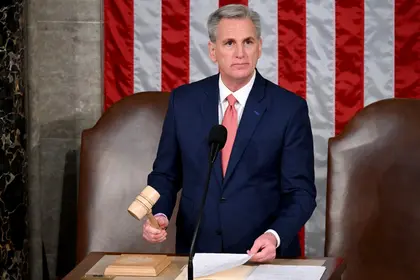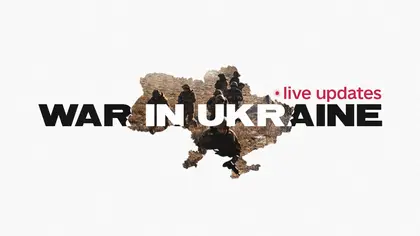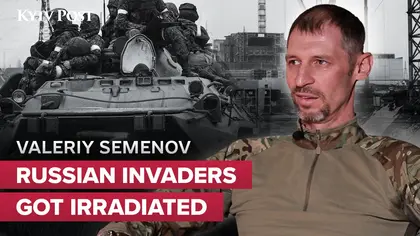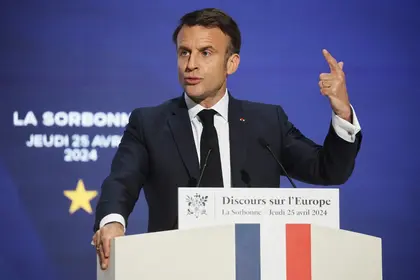The tone of a cadre of Republican lawmakers, who oppose crucial aid to Ukraine is growing more pugilistic – well beyond the realms of what their constituents report in U.S. public opinion polls.
They constitute a minority in Congress and within their own party, yet their messages are receiving inflated media attention and are beginning to resonate with ordinary citizens, who are beginning to question how and where the $34 billion of committed government security assistance is going.
Overall, the administration of U.S. President Joe Biden has directed more than $100 billion of overall aid in various forms since Feb. 24, 2022, when Kremlin autocrat Vladimir Putin ordered a full-scale invasion of Ukraine in an ongoing war against the neighboring country that is entering its tenth year.
Congressionally approved funding for Ukraine, in the previous year ,accounted for only 5.6 percent of total defense funding and 2 percent of the U.S. budget, or $0.25 per day for every citizen.
Republican House of Representatives speaker Kevin McCarthy’s recent insistence that aid to Ukraine “can’t be a blank check” has been frequently repeated by other Republicans, some of whom still don’t recognize the legitimacy of Biden’s election and publicly repeat Kremlin narratives concerning the war.
This rogue unit seemingly refuses to see how the aid bolsters U.S. interests and promotes a rules-based international order.

Ship Moving N. Korean Arms to Russia Spotted in Chinese Port: Reuters
“But Russia is a primary adversary of the U.S. A top-tier rival not too far behind China, its number one strategic challenger,” the National Review wrote in November. “In cold, geopolitical terms, this war provides a prime opportunity for the U.S. to erode and degrade Russia’s conventional defense capability, with no boots on the ground and little risk to U.S. lives.”
Contrarians and conspiracy-mongers
Still, House representatives such as, Marjorie Taylor Greene, from Georgia – an apostle of QAnon conspiracy theories, who questions the legitimacy of Biden’s election – are pushing for more oversight on how money intended for Ukraine is being spent.
“Under Republicans, not another penny will go to Ukraine,” Taylor Green said in November.
In March of last year, just a month into the full-on onslaught, she said: “You see Ukraine just kept poking the bear…which is Russia, and Russia invaded. And the hard truth is… there is no win for Ukraine here. Russia is being very successful in their invasion.”
Although, she and other colleagues who continue to question the reason for why the U.S. is the world’s largest aid provider to Kyiv in monetary terms – not per capita GDP – they also want to cut it off.
Representative Matt Gaetz, a Republican from Florida, firmly questioned Pentagon officials at a House Armed Services Committee on Feb. 28 after they said audits found no “systemic” wrongdoing with the billions of dollars that Washington has provided.
He furthermore in February introduced a “Ukraine Fatigue Resolution” in the House that seeks to end “military financial aid to Ukraine.”
On his personal website, Gaetz stated on Feb. 9 that “we must suspend all foreign aid for the War in Ukraine and demand that all combatants in this conflict reach a peace agreement immediately.”
He also challenged the Defense Department’s Inspector General Robert Storch on Feb. 28 during the same committee hearing: “You cannot testify that everything is complying with the law in end-use monitoring.”
The U.S. and the EU have instigated tracing and scanning systems for the funds they are providing to Ukraine as it defends itself in Europe’s bloodiest war since World War II.
Survey findings
Recent U.S. polls dating from late last year to this month show a disconnect between what Republicans think about Ukraine and what a minority of their representatives on Capitol Hill express.
A survey, conducted by pollster YouGov on behalf of The Economist magazine, found only 6 percent of respondents who identified as Republican “sympathize” with Russia over Ukraine in the war.
The Chicago Council on Global Affairs found, in a nationwide survey published in December, that a “solid majority” of Americans continue to support “supplying Ukraine with arms (65 percent) and economic aid (66 percent), accepting Ukrainian refugees (73 percent) and sanctioning Russia (75 percent).
The “most vocal critics” of providing aid to Ukraine “are among Republicans… who are still a minority on the Hill,” said Emily Sullivan, research assistance on public opinion and a member of the U.S. foreign policy team at the think tank.
In an audio interview with the Kyiv Post, she said that “claims that support is slipping are overblown.”
Regarding the “speed with which aid is being provided to Ukraine, it is no surprise that questions are being raised as to what is the end marker here… I don’t see there is a reason to be concerned yet.”
Yet public opinion is pivoting among those who think that the U.S. is providing “too much support to Ukraine,” a survey released in January by the Pew Research Center found:
“The share of adults who say the U.S. is providing too much aid to Ukraine has increased 6 percentage points since last September and 19 points since shortly after Russia launched its [repeat] invasion of Ukraine last year,” the pollster said.
Starkly, Pew concluded that “this shift in opinion is mostly attributable to the growing share of Republicans who say the U.S. is providing too much support to Ukraine. Today, 40 percent of Republicans and Republican-leaning independents hold this view, up from 32 percent in the fall and much higher than the 9 percent who held this view in March of last year.”
Other Republican lawmakers remain undecided or on the fence.
“Ukraine is not our friend, and Russia is not our enemy,” Representative Paul Gosar from Arizona tweeted last month.
One of the news platforms that has amplified the principal detractors of Ukraine on Capitol Hill is Fox News and one of its chief television hosts, Tucker Carlson.
As recently as February, he said Ukrainian President Volodymyr Zelensky “is not a hero… He is an instrument of total destruction.”
And as far back as 2019, before the all-out invasion, Carlson said that “I think we should probably take the side of Russia, if we have to choose between Russia and Ukraine.”
The views expressed in this opinion article are the author’s and not necessarily those of Kyiv Post.
You can also highlight the text and press Ctrl + Enter






Comments (6)
American Republicans tend to be Christians, and many are rabid evangelicals. Putin's propaganda media has been masterful in convincing these Israel-obsessed fanatics that Ukraine is run by Nazis and that Putin is the Russian equivalent of Donald Trump, a loyal humble patriot fighting off the LGBTQ Left..
These evangelists still consider Stalin an American ally because helped destroy Hitlhey DO NOT CARE that millions of Ukrainians have been murdered by the Kremlin since 1931.
Zelenskiy should be flying an Israeli flag next to Ukraine's to represent Ukraine's Jewish population. This would cause these fake republican christians to support Ukraine.
Patriarch Kiril and Putin are seen as victims and Russian heroes.
As an American, I hope that Zelenskiy will start
I agree 100% with Gary. These people who dont want to support Ukraine sound exactly like the people who said the war in Europe is not our problem in 1940 and 41. How did that turn out? Anyone who believes Putin or his gang will stop once Ukraine is taken will be remembered just as Chamberlin and Lindbergh are today. Putin sees America as his mortal enemy and he will do anything to poke a fight with us if he thinks he can win. Including launch a nuke. No amount of appeasing will stop him. He is just like Hitler. Mark my words..
I say to the Republicans who wnat to stop helping Ukraine, go to Ukraine, go there and meet the woman, the men, the soldiers, the children, meet them in their shelters, meet them in the heatless, waterless homes, tell them to their face, as you see their pain in their eyes and in their faces the lost of their peace and the loss of loved ones that you do not support them and will let Russia take from them what they want? Go ahead go and tell them, let's see the courage you have!
Here we go! Once again some of these people are either to dam biked, or are communist within their party of representatives, who wnat to see a world order change where all governments seek control of the population like Iran, and North Korea and Russia. I see the change slowly happening, Mr president, you keep doing what your doing, it is still great to see someone who is looking with his eyes wide ipen amd see what can and will ck.e without the world's support in this God awful invasion that is turing the world inside out. Everytime I hear someone in the state say they don't want to help Ukraine, it os either they are on Russia side inside your house, or they are just blind cattle. Sure let's stop the funding and have the rest of the world then go war and take what they want as this will show it is allowed. Putin, I have to give it to him, he is smarter then most of the house speakers, he knew you would give in, time will be on his side. He knows the greed of the west, he knows there will come a day you are forced to stop assisting Ukraine against there right to live in peace and sovereignty. The west as a leader of the world, the day we stop helping eachother in times like these, in times of war, when a sovereignty of a country, their right to defend and live in a peaceful way stops it is the end of democracy, end of peace, end of a world being united. Yes I am all about settling things peaceful without bloodshed and cost to all others. But at what cost?
I am afraid Ukrainians will have to break the long-held practice of not commenting or taking a position on another country's politics because it is not in a position to do so. Not anymore - in a fight for your right to exist as a country and as a people, I know you can see that a large and growing proportion of American Republicans want to see Russia prevail and enslave your country. The coalition of Ukrainian supporters in America, led by the Democratic Party and President Joe Biden, are the only friends you have in America. Ukrainians with family and friends in America - implore them to fundraise, volunteer, and vote for Democrats in every upcoming election to keep the aid flowing to Ukraine.
@John Hughes, your claim that "a large and growing proportion of American Republicans want to see Russia prevail" is completely false. There is a small segment of Republicans who are so offended by the out of control US government - in terms of spending, suppression of political opposition, suppression of personal liberties etc. - that they oppose spending money on the Ukraine war. Perhaps they are still in cold war mode, writing off an ex-soviet republic as in the Russian sphere of influence, and not worth getting into a shooting war over. They are perfectly right about being horrified by the current trajectory of the US government overall, but I believe this prevents them from thinking clearly about the Ukraine issue.
But this segment is not at all a large of American Republicans, nor does it appear to be growing. It is a minority in the Republican party, and a minority of Americans. Hughes, your shameless lie that the only support Ukraine gets is from Democrats, and your brazen appeal for Ukrainians even to fundraise for Democrats, is just partisan nonsense, and makes it clear your focus is on a US domestic election victory for your preferred side, rather than Ukraine's victory in an actual war. Have some decency, and acknowledge the truth that Americans of all stripes and all political persuasions are vocal in their support for Ukraine at this time.
The other side of the story is that in America there has been 2 years of violence by proclaimed Marxists, Bolsheviks and useful idiots rebelling against American Constitution of Free Speech, democracy and individual liberty. Trump was first in providing weapons to Ukraine. Trump was severely criticized for saying NATO must increase support for it's defense. Now America has an economic crisis of inflation, bank failures, large layoff of private firm workers and greatest ever debt, all due to recent massive government spending. However, a majority of Americans including me support Ukraine's defense against Putin's invasion. America will do much for Ukraine to win, and after the war, to prosper.